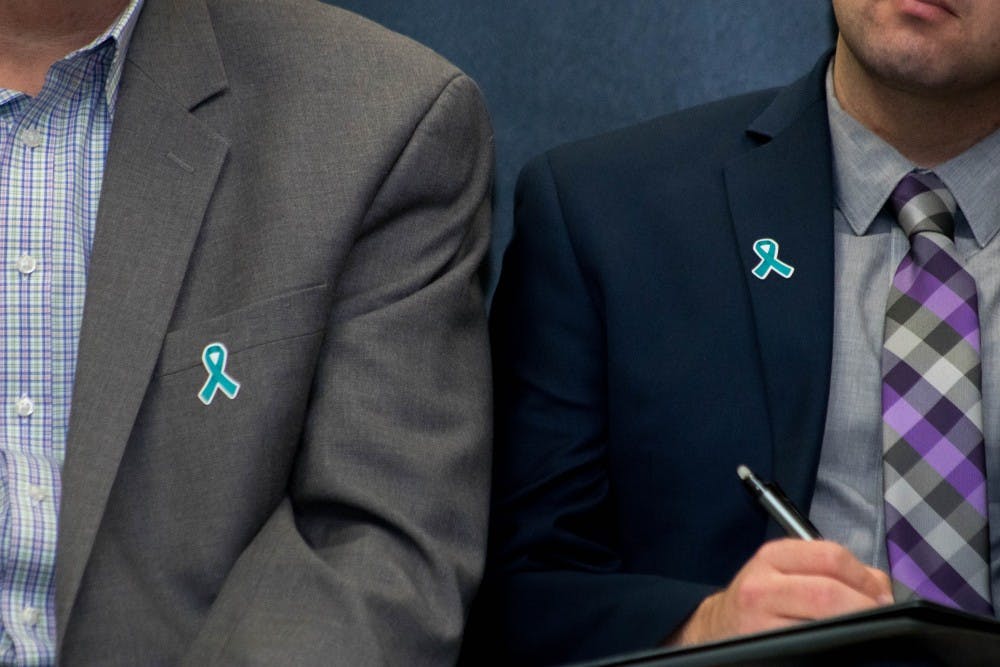Mary Finn, director and professor in the School of Criminal Justice, is one of several faculty members on the 19-person presidential search committee, and is a representative of the MSU Faculty Senate. At its meeting on Tuesday, she discussed what the committee has been working on in the last month.
Although the notes from the input sessions are being used to inform and guide the committee through the second phase of the process, this phase will not involve members of the public. Faculty members brought forward questions and concerns in regards to the process, the advertisement and transparency at the meeting.
"It's not a transparent process — we will have no input until they announce the person. We will not see any of the candidates. We have no way of judging them," said Lisa Lapidus, professor in the College of Natural Science. "At this point, we're blind."
Update on the MSU presidential search
Following the release of the position advertisement on Nov. 5, the presidential search committee and the search firm, Storbeck/Pimentel & Associates, are currently working on drafting the official position description that applicants can respond to.
This document will be significantly longer than the advertisement. It will include details about the institution, as well as the required and preferred qualifications for the next president gathered from the input sessions.
"If you look at the notes from the input sessions, while there are some common themes that come across, there's also not," Finn said. "There are times when it's difficult to see the commonality and the threads of what is first and foremost on individuals' minds, and that makes it more challenging as we move forward with the selection process, the interviews and coming up with those potential candidates."
So far, the position advertisement — which requires the next president to have a "demonstrated commitment" to equity, inclusion and justice along with exemplary academic credentials — has already appeared in The Chronicle of Higher Education, The Hispanic Outlook in Higher Education, The Journal of Blacks in Higher Education, Asians in Higher Education and more.
The roles of search committee members, the various stages of the selection process and the eventual screening and interviewing of candidates are currently being discussed as well.
"What gives me hope is that I've seen this collective group of individuals brought together on this search committee to be a group that is really listening to each other," Finn said.
Raising concerns about the process
Andaluna Borcila, a James Madison College professor and member of Reclaim MSU, said she was concerned the issue of sexual misconduct was not mentioned in the position advertisement.
At the final input sessions, Reclaim MSU members emphasized addressing "toxic, pervasive rape culture" as the No. 1 priority for the future president. In light of ex-MSU doctor Larry Nassar's abuse, the group's statement calls for someone who will address "the administration’s lack of response to, prevention of and investigation of instances of sexual misconduct.”
"When I saw the ad, I was troubled by the fact that one criteria that I and others — including Faculty Senate — thought would be important was not made clear as a very important criteria in the ad already, which is somebody who has expertise in and commitment to addressing issues of sexual assault." Borcila said.
Finn said this point was brought up in the committee and although it wasn't addressed in the one-page position ad, it could be addressed in the in-depth position description.
"I think that this can be very well perceived as concealing something that should be looked at as a priority since we have been attempting to manage and not directly address this issue for quite some time, so I'm very concerned about that issue." Borcila said.
Support student media!
Please consider donating to The State News and help fund the future of journalism.
Lapidus said there needs to be more communication between the presidential search committee to the Faculty Senate and the university as a whole.
"What I'm really interested in knowing is, as you are our proxies, what are you going to be looking for. That needs to be made clear," Lapidus said. "That's the kind of transparency we're looking for, not just a whole bunch of stuff posted on a web page."
Borcila said she hopes the committee will hold open forums with presidential candidates and allow for community input in the board's final decision, which will be made in June 2019.
"At the beginning, I wasn't certain that that message was being heard by some members of the search committee," Finn said. "But I do believe that it has been heard, and I think there will be a response to it. I hope when that is shared, that you all will view it as a positive step forward."
Responding to the community
In response to concerns with half of the Board of Trustees being on the presidential search committee, the Faculty Senate and the University Council passed a proposal to eliminate the "double voting" that goes against standard search committee practice.
This would allow co-chairs Melanie Foster and Dianne Byrum, Trustee Dan Kelly and Trustee Joel Ferguson to have a say when the entire Board of Trustees chooses the new president, but not when forwarding candidates.
The proposal was sent to the Board of Trustees and the presidential search committee, and Finn said it is still being deliberated and discussed. The Board of Trustees have yet to respond.
Deborah Moriarty, who presented the proposal as the vice chairperson of the University Council, asked if it would be helpful to the committee if the Faculty Senate passed another resolution asking for more transparency in the process.
"The more that bodies on campus express what it is they want, the easier it is to get movement in that direction," Finn said. "Silence is not a good thing at this point."
Identifying candidates and initial interviews will begin after the position description is released, and final interviews with the Board of Trustees are set to occur between February and May.
An official statement from the co-chairs of the search committee will be released later and will describe the process more fully, Finn said. It will also respond to concerns raised by the Faculty Senate, the University Council and concerns heard at the input sessions.
For more information, read the State News' in-depth look at the MSU presidential search process and the community's response.
Discussion
Share and discuss “As MSU presidential search enters new phase, faculty raise concerns” on social media.







